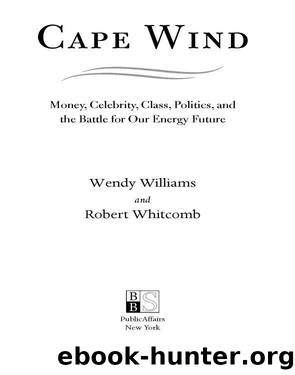Cape Wind by Robert Whitcomb

Author:Robert Whitcomb
Language: eng
Format: epub
Publisher: PublicAffairs
On August 28, Cronkite picked up the phone and called the Associated Press to announce that he no longer opposed the project. He also insisted that the Alliance no longer use his image in their infomercial. The newsman was particularly annoyed because, without his permission, the Alliance had been sending the video out as part of their massive fund-raising package. Exactly how much money the Alliance made by marketing Cronkiteâs image was never revealed.
In the midst of this Hallowed Halls of High Journalism drama, the professionâs working stiffs started sniffing around. Media critic Mark Jurkowitz, then with the Boston Globe, started making calls at just about the time Burkett rode into town. Jurkowitz, hailing from northeastern Pennsylvania coal country, graduated from Boston Universityâs School of Communications in 1975. After several years of knocking around out west, he began writing features and news for various Greater Boston newspapers, but his real interest was the media itself. He wrote a column called âDonât Quote Meâ for the Boston Phoenix, an independent weekly, then began writing for the Boston Globe.
Jurkowitz intended to cover the Cape Cod Times itself, rather than the project. He had a reputation for being calm, judicious, and measured in his writing, but criticizing a newspaper is never easy. Jurkowitz was intrigued by the role the Cape Cod Times was playing in the Cape Wind story and accepted an assignment from a small Boston-based quarterly public-policy magazine to investigate the issue. Editors do not like to answer the phone and find Mark Jurkowitz on the other end, but initially at least, when the media critic called Cliff Schechtman, the editor seemed cordial enough.
To Jurkowitz, the journalistic issue was not whether their editorials were over the topâthat was almost universally accepted by thenâbut whether that over-the-top attitude had crossed onto the news pages. Cape Wind had given Jurkowitz twelve news articles the company felt were problematic. Of those, the media critic dismissed half outright, believing them to be acceptable. Of the remaining six, he found three with what he considered âserious problems.â
When his piece finally appeared in the magazine Commonwealth, Jurkowitz wrote that opposition to the project was âa view hammered home relentlessly on a take-no-prisoners editorial page determined to strangle the wind farm idea in its cradle,â and a subhead asked âHas the Times launched a journalistic jihad?â
The critic wrote that the news pages and the editorial pages sometimes played off each other, ignoring the separation of powers between news pages and editorial pages that is considered essential to responsible journalism. âIn boxing, that would be a three-punch combination,â he wrote, adding that the editorials âhave been insistent and more than occasional.â Vis-Ã -vis the Patrick-Wheatley election, Jurkowitz confirmed that the newspaperâs editorials were relentless. He gave plenty of print space to Schechtman and Meyer, who insisted their coverage had been fair on all accounts. âWeâve taken a strong editorial position on this,â Meyer told the media critic. âBut as strongly as we feel about the wind farm from an editorial position, we feel more strongly about .
Download
This site does not store any files on its server. We only index and link to content provided by other sites. Please contact the content providers to delete copyright contents if any and email us, we'll remove relevant links or contents immediately.
Zero to IPO: Over $1 Trillion of Actionable Advice from the World's Most Successful Entrepreneurs by Frederic Kerrest(4566)
Machine Learning at Scale with H2O by Gregory Keys | David Whiting(4312)
Never by Ken Follett(3953)
Harry Potter and the Goblet Of Fire by J.K. Rowling(3856)
Ogilvy on Advertising by David Ogilvy(3621)
Shadow of Night by Deborah Harkness(3366)
The Man Who Died Twice by Richard Osman(3077)
Book of Life by Deborah Harkness(2937)
The Tipping Point by Malcolm Gladwell(2920)
Will by Will Smith(2919)
Purple Hibiscus by Chimamanda Ngozi Adichie(2851)
0041152001443424520 .pdf by Unknown(2845)
My Brilliant Friend by Elena Ferrante(2829)
How Proust Can Change Your Life by Alain De Botton(2812)
How to Pay Zero Taxes, 2018 by Jeff A. Schnepper(2653)
Hooked: A Dark, Contemporary Romance (Never After Series) by Emily McIntire(2553)
Rationality by Steven Pinker(2363)
Can't Hurt Me: Master Your Mind and Defy the Odds - Clean Edition by David Goggins(2339)
Borders by unknow(2312)
